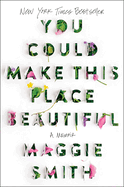
"This isn't a tell-all," poet Maggie Smith (Goldenrod; Keep Moving) writes in the opening pages of her brilliant, beautiful memoir, You Could Make This Place Beautiful. It can't be, she argues, because she is not an omniscient narrator, she cannot know all, and because some of what she offers in the pages that follow is, in fact, an account of what she does not know. It's a "tell-mine" instead, a version of the pain and hardship brought on by the dissolution of her marriage--but also found in the marriage itself, in a life spent making herself small enough to fit inside of an institution and a partner that did not serve her, not really, or offer room for growth and expansion.
You Could Make This Place Beautiful could easily be described as brutal in its telling. But in that darkness, Smith finds the promised beauty: in the soft fuzziness of her young son's earlobe, in learning to rollerblade during lockdown, in the cake dropped off by a neighbor on her first Christmas morning waking up without her kids. In these tellings, her memoir remains somehow soft in its brutality, yearning toward what is most human in us all: a desire to see and be seen, to understand and be understood. "I'm trying on so many metaphors, pushing toward understanding."
You Could Make This Place Beautiful makes a gift out of Smith's pain, tied up not in a neat bow, but offered with grace, humility and wonder as something to be treasured and held up gently, to see what it may reflect of ourselves when it touches the light. --Kerry McHugh, freelance writer

